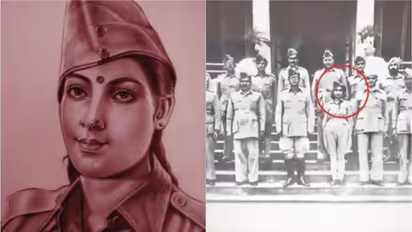India Untold: Forgotten story of Neera Arya, India's first woman spy in Netaji's army

Synopsis
Neera Arya, India’s first woman spy in the Indian National Army, risked everything for the country’s freedom, enduring torture, killing her British-officer husband to protect Netaji, and remaining loyal despite extreme personal suffering and poverty.
In the pages of India’s freedom struggle, some names shine less brightly despite their monumental sacrifice. One such unsung hero is Neera Arya, often hailed as India’s first female spy in the Indian National Army (INA) led by Netaji Subhas Chandra Bose.
Who was Neera Arya?
Born on 5 March 1902 in Khekra Nagar, Baghpat district (now in Uttar Pradesh), Neera came from an influential family. Her father, Seth Chhajjumal, a well-known businessman, ensured Neera received her education in Kolkata. But Neera was drawn to something beyond books and business. She was deeply committed to the cause of India’s freedom.
Her patriotic spirit led her to join the Rani Jhansi Regiment in the Azad Hind Fauj. Soon, she married Srikant Jai Ranjan Das, a British Army officer and CID inspector. But the union was troubled from the start due to their conflicting political beliefs. Srikant was loyal to the British, while Neera had secretly joined Netaji’s underground network.
A life-changing decision
One day, Srikant followed Neera when she went to meet Netaji. During the confrontation, he opened fire, injuring Bose’s driver. Realising the danger to Netaji’s life, Neera stabbed her husband to death, saving the leader. The British arrested her and sentenced her to imprisonment in the Andaman Cellular Jail, notorious for its harsh conditions.
Refusal to betray Netaji
While in jail, Neera was offered bail in exchange for information on Bose and the INA, but she refused to betray her comrades. Historical accounts suggest she was tortured brutally, including having her breasts mutilated for refusing to cooperate. Despite the unimaginable pain, Neera remained steadfast in her loyalty to India and Bose.
Later, she was appointed a spy in the INA. In her own writings, she mentions working with fellow female spy Saraswati Rajamani, disguising themselves as boys and infiltrating British camps to gather crucial intelligence.
Her final years
Despite her immense sacrifices, Neera lived her later years in poverty, selling flowers near Falaknuma, Hyderabad. She passed away on 26 July 1998 at Osmania Hospital, her life mostly forgotten by the nation she served so selflessly.
The biopic by Roopa Iyer
More than seven decades after independence, her remarkable story is finally getting the recognition it deserves through a new Bollywood biopic directed by Roopa Iyer.
Kannada director Iyer is set to revive Neera Arya’s legacy through a biopic that marks her Bollywood debut as both actor and director. The film, she says, is based on extensive research, including interviews with people in Neera’s birthplace and study of historical records.
Roopa said, “We’ve heard of Gandhi and Bose, but there are many like Neera Arya whose stories are unknown. This film is to remind future generations of their bravery.” The script has been penned by National Award-winning writer Varun Gautham.
Known for acclaimed films like Mukhaputa and Chandra, Iyer promises an emotionally powerful story told through a journalist’s perspective.
Why Neera Arya’s story matters
In an age where historical films often revisit known figures, Neera Arya’s story stands out as it is a tale of courage, conflict, and commitment. She not only defied colonial powers but also personal relationships, choosing country over comfort.
This film promises to be more than just a biopic. It’s an attempt to bring back into the national memory a freedom fighter who gave everything for India, yet died in obscurity.
Neera Arya’s legacy is a reminder: freedom was won not just in speeches and protests, but in blood, betrayal, and unbroken spirit.
Stay updated with the Breaking News Today and Latest News from across India and around the world. Get real-time updates, in-depth analysis, and comprehensive coverage of India News, World News, Indian Defence News, Kerala News, and Karnataka News. From politics to current affairs, follow every major story as it unfolds. Get real-time updates from IMD on major cities weather forecasts, including Rain alerts, Cyclone warnings, and temperature trends. Download the Asianet News Official App from the Android Play Store and iPhone App Store for accurate and timely news updates anytime, anywhere.